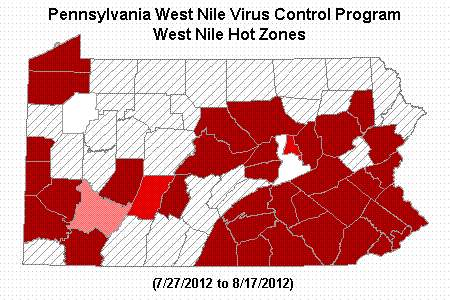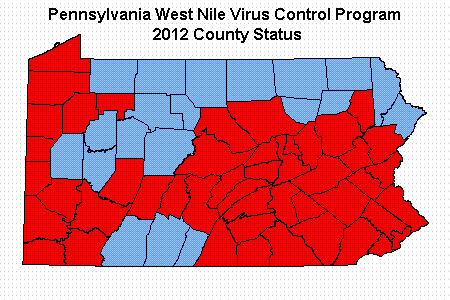Green Pest Solutions West Nile Virus update - Latest Case
A 77-year-old Burlington County resident is the first New Jersey resident to die this year from the mosquito-borne West Nile virus, authorities said Friday September 9, 2012.The death was reported as state and local agencies ramped up efforts to combat the virus, and New Jersey health officials announced that the number of confirmed virus cases had jumped from eight last week to 15.
In 2000, West Nile virus appeared for the first time in Pennsylvania in birds, mosquitoes and one horse. To counter the spread of the virus-which is transmitted by mosquitoes-Pennsylania has developed a comprehensive network. The network covers 40 counties and includes trapping mosquitoes, collecting dead birds and monitoring horses, people and, in previous years, chickens.
In Pennsylvania, 17 residents have tested positive for West Nile Fever and Encephalitis/Meningitis; one, an elderly Luzerne County man, died, officials said. According to Pennsylvania’s West Nile Control program, 75% of all cases are in the following counties: Bucks, Chester, Delaware, Lancaster, Lehigh, Montgomery and Philadelphia-that’s 18 of 14 cases. According to the program, of the 24 cases reported, 11 are male and 13 are female. 92% of those cases are reported to be within the age distribution of 18-79 years of age and 75% of the cases are between ages 40-79. The Pennsylvania West Nile Virus Control Program reports 17 of the 24 cases as Encephalitis/Meningitis and 7 of the 24 cases as West Nile Fever.

Insect experts and epidemiologist believe the mild winter followed by a hot and dry summer is core contributions to West Nile virus epidemic. In addition to the human cases document by the Pa. West Nile Control Program, a number of mosquitoes were caught in local nesting grounds and subsequently tested positive.
August and September were the peak times for West Nile virus. People are still urged to “Fight The Bite,” to prevent mosquito bites.
Please read the following “What Can I Do” to prevent West Nile in your community. Remember, the best defense against the West Nile is not giving them a place to breed. Here are things you can do around your property within your community.
- Dispose of any sort of water-holding container such as cans, pots and even your children’s kiddie pools.
- Pay extremely close attention to unwanted tires. Stagnant water in tires is ideal breeding grounds for mosquitoes.
- If your recycling container doesn’t already have drilled weep holes, make sure you drill them yourself as they are left outdoors and inevitably can become a water-holding container.
- Make sure your rough gutters are cleaned at least once a year. Moreover, if you have hanging trees or shrubs near them that plug up the drains. Roof gutters can produce millions of mosquitoes each season.
- Turnaround wheelbarrows and do not let water stagnate in birdbaths. Both provide ideal breeding locations for domestic mosquitoes.
According to Pennsylvania’s West Nile virus program, if West Nile virus is found in your community here are ways to protect yourself, family and friends:

- Take normal steps to prevent insect bites.
- Don’t walk around barefoot. Wear shoes, socks, pants and long-sleeved shirts when outdoors for an extensive period of time—or when mosquitoes are active.
- Consider the use of mosquito or bug repellent. If applied, wash all skin and clothing when returning indoors. Read the CDC’s latest information on the use of DEET in Insect Repellent Use and Safety.
Always feel free to contact your number one local pest professionals Green Pest Solutions at 855-312-7157 with any questions regarding mosquitoes and or other pests and insects. We are your number one community pest and insect control resource. Ask about our year round pest protection services. Protect your home against pests, termites, ants, stink bugs, bees, spiders, bed bugs, rodents and much more!
Don’t forget to like us on Facebook , follow us on Twtter and LinkedIn, and +1 us on Goolge+